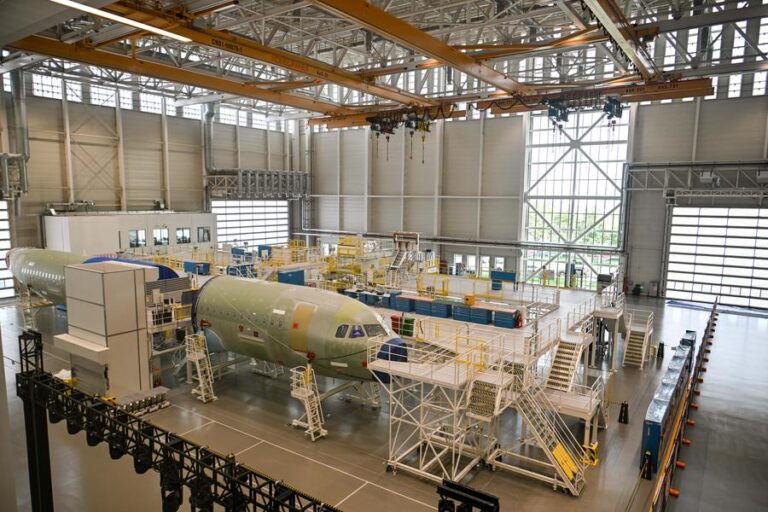TIANJIN, Oct. 26 (Xinhua) — Airbus inaugurated its latest Final Assembly Line for A320 family aircraft in the northern Chinese port city of Tianjin earlier this week, marking a milestone in the European aerospace giant’s 40-year journey in China and signaling a broader trend of foreign enterprises doubling down on their commitments to the world’s second-largest economy.
The new facility underscores the company’s robust confidence in China’s aviation market, resilient supply chain and business-friendly environment.
Airbus’ growth in China mirrors its rising market share — from about 20 percent in 2008 to over 50 percent today, with China now its largest single-country market for commercial aircraft.
“We welcome the addition of Tianjin’s second line to our global production system, as it provides us with the necessary flexibility and capacity to deliver on our plan to assemble 75 A320 family aircraft per month in 2027,” Airbus CEO Guillaume Faury said at the launching ceremony.
He emphasized that this expansion reflects Airbus’ optimism about China’s thriving aviation sector, strong industrial base and favorable investment climate. The project, initiated under a framework agreement signed in April 2023 in the presence of Chinese and French leaders, and which broke ground in September 2023 — was completed remarkably quickly, a testament to what Faury termed “China speed.”
The rapid progress of the Tianjin project impressed EU Ambassador to China Jorge Toledo Albinana, who had attended the groundbreaking ceremony two years earlier. He described the project as a prime example of China-EU cooperation — combining strengths in design, innovation and skills.
Beyond aerospace, other multinationals are also reinforcing their presence in China. Apple CEO Tim Cook announced increased investment in China on Oct. 15, while Pfizer CEO Albert Bourla highlighted on Oct. 14 that 30 percent of global drug R&D had occurred in China over the past decade. John Waldron, president and chief operating officer of Goldman Sachs Group, noted on Oct. 15 that the firm had completed key capital market transactions for Chinese companies this year.
Official data from China’s Ministry of Commerce shows that actual foreign direct investment utilization over the past five years had reached 708.73 billion U.S. dollars by June 2025.
A Shanghai American Chamber of Commerce report, meanwhile, revealed that 71 percent of U.S. firms in China were profitable in 2024 — up 5 percentage points year on year.
Over the past five years, amid persistent turbulence in the global landscape, a chilling trend of de-globalization and multiple shocks to industrial and supply chains, China’s economy has successively surpassed the 110 trillion (roughly 15.5 trillion U.S. dollars), 120 trillion and 130 trillion yuan benchmarks, respectively, in terms of total economic output. It is projected to reach around 140 trillion yuan in 2025 — with China’s average annual contribution to global economic growth remaining at approximately 30 percent.
Dan Watkins, CEO of J.P. Morgan Asset Management Asia Pacific, described China as a “super contributor” to the firm’s regional growth strategy, and revealed that the company is aiming to double its assets under management in this region to 600 billion U.S. dollars in the next five years.
While meeting with Airbus CEO Faury in Beijing on Oct. 21, China’s Commerce Minister Wang Wentao said the country’s market has continued to expand steadily in recent years — becoming the world’s second-largest consumption market as well as the second-largest import market globally.
China will further advance Chinese modernization and foster new quality productive forces, the minister said, adding that this will create vast opportunities for foreign enterprises, including Airbus. ■

